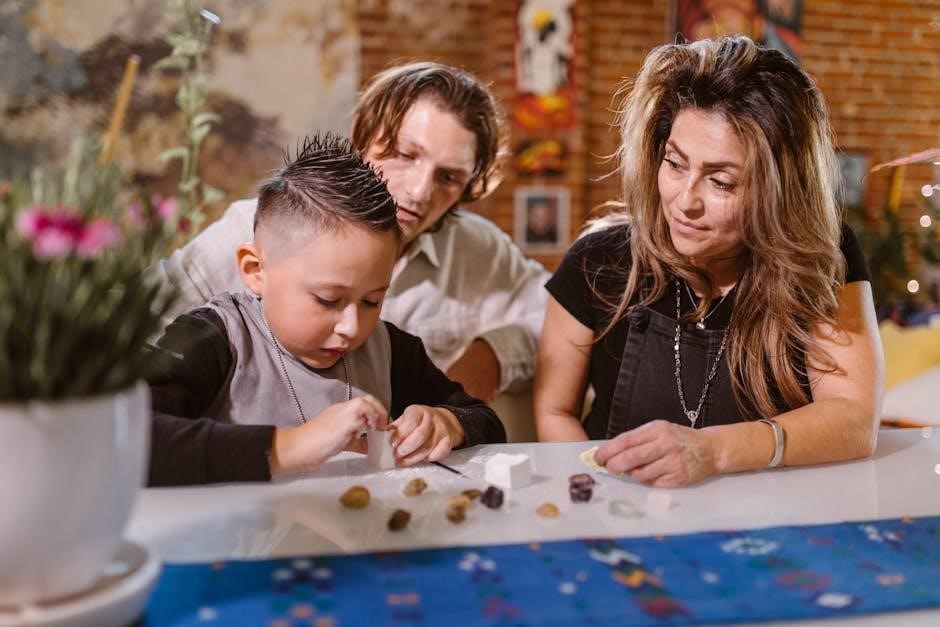The classic Jenga game has been creatively transformed into a therapeutic tool, fostering rapport and engagement, particularly with children, by incorporating thought-provoking questions to enhance emotional expression and connection.
What is Therapy Jenga?
Therapy Jenga is an innovative adaptation of the classic Jenga game, designed to serve as a therapeutic tool. Each Jenga block is labeled with specific questions or prompts that players must answer when they remove a block. This approach combines the engaging, tactile nature of Jenga with meaningful conversation starters, making it an effective method for building rapport and fostering emotional expression in therapy sessions. The questions are tailored to various therapeutic goals, such as social-emotional learning, cognitive-behavioral skills, and self-reflection, allowing therapists to customize the experience based on client needs. By integrating fun and interactivity, Therapy Jenga creates a relaxed environment for clients to communicate openly. The questions are easily accessible as downloadable PDFs, offering flexibility and convenience for therapists. This unique blend of play and structured dialogue makes Therapy Jenga a versatile tool for enhancing therapeutic outcomes.
Benefits of Using Jenga in Therapy
Using Jenga in therapy offers numerous benefits, including fostering engagement, reducing anxiety, and encouraging meaningful conversation. The tactile nature of the game provides a calming effect, helping clients feel more at ease. The structured yet playful environment allows therapists to build rapport and trust with clients, particularly children, who may find traditional talk therapy intimidating. Jenga’s interactive approach enhances focus and participation, making it an effective tool for exploring emotions and thoughts. Additionally, the use of pre-prepared questions on Jenga blocks ensures sessions are purposeful and targeted, promoting self-expression and insight in a non-threatening manner.

Creating Therapy Jenga Questions
Therapy Jenga involves writing thoughtful questions on blocks to spark meaningful conversations, focusing on feelings, strengths, and social skills, making sessions engaging and therapeutic.
Designing Effective Questions for Jenga Blocks
Designing effective questions for Therapy Jenga involves tailoring prompts to clients’ needs, ensuring they are age-appropriate and thought-provoking. Questions should balance fun and depth, encouraging reflection. Open-ended inquiries about feelings, strengths, and challenges are ideal. Cognitive-behavioral and strengths-based questions help children identify positive patterns and coping strategies; For younger clients, simpler questions about emotions or friendships work well, while older clients may benefit from deeper explorations of self-awareness. Questions can be written directly on blocks or laminated for reuse. The goal is to create engaging, meaningful dialogue that fosters connection and insight.
Examples of Therapy Jenga Questions
Therapy Jenga questions are designed to spark meaningful conversations and self-reflection. Examples include, “What makes you feel comforted?” or “What do you think you’re really good at?” These prompts encourage emotional expression. For social skills development, questions like, “How do you handle disagreements with friends?” or “What would you do if someone felt left out?” can be used. Other examples might focus on self-awareness, such as, “What’s something you’re proud of?” or “What’s one thing you wish you could change?” These questions are adaptable for various age groups and therapeutic goals.
Using Jenga in Play Therapy
Jenga transforms traditional play therapy by engaging clients through physical interaction and strategic thinking. Each block can be inscribed with therapeutic questions, encouraging self-expression and dialogue. The game’s collaborative nature fosters trust and rapport between therapist and client, creating a relaxed environment for emotional exploration. Observing how clients navigate the game reveals insights into their problem-solving skills and emotional resilience. This innovative approach makes therapy accessible and enjoyable, particularly for children, by merging play with purposeful communication.
How Jenga Helps Build Rapport with Clients
Jenga fosters a relaxed and engaging environment, allowing clients to express emotions and thoughts naturally. The physical interaction and collaborative nature of the game create a sense of trust and connection. By focusing on shared goals, clients feel supported, reducing anxiety and encouraging openness. The lighthearted competition helps break down barriers, making therapy feel less intimidating. This playful approach enables therapists to build strong rapport, especially with children, by creating a space where clients feel heard and understood. The game’s simplicity makes it accessible, ensuring meaningful interactions and emotional bonding during sessions.
Applying Jenga to Different Age Groups
Jenga’s versatility allows it to be adapted for various age groups, making it an effective therapeutic tool for children, adolescents, and adults. For younger clients, aged 6 and above, the game introduces basic social and emotional concepts through simple questions. Teenagers benefit from more complex prompts that encourage self-reflection and exploration of emotions. Adults can engage with deeper, thought-provoking questions that address life experiences and coping strategies. The adaptability of Therapy Jenga ensures that its benefits, such as rapport-building and emotional expression, can be tailored to meet the unique needs of each age group, fostering growth and understanding across all stages of development.

Therapeutic Goals with Jenga
Jenga enhances social-emotional learning, communication, and problem-solving skills, fostering self-awareness, emotional regulation, and teamwork. It helps clients process challenges and develop healthy coping strategies in a fun, engaging way.
Enhancing Social-Emotional Learning
Therapy Jenga fosters social-emotional learning by encouraging self-reflection, empathy, and communication. Structured questions on Jenga blocks help clients identify emotions, develop problem-solving skills, and build self-awareness. This tool promotes healthy emotional regulation, teamwork, and understanding of others’ perspectives, making it an engaging way to enhance social-emotional growth in a therapeutic setting.
Developing Cognitive-Behavioral Skills
Cognitive-behavioral skills are effectively developed through Therapy Jenga by addressing thought patterns and behaviors. Questions on the blocks guide clients to explore situations, analyze choices, and identify consequences. This interactive approach helps individuals recognize negative thought cycles and practice more constructive responses. By fostering self-reflection and accountability, Therapy Jenga becomes a dynamic tool for promoting positive behavioral change and emotional resilience in a fun and engaging manner.
Therapy Jenga for Social Skills Development
Therapy Jenga enhances social skills by encouraging meaningful conversations, helping clients identify strengths and challenges, and fostering self-expression through structured, engaging interactions.
Identifying Strengths and Challenges
Therapy Jenga effectively helps clients identify their strengths and challenges through targeted questions. By asking open-ended prompts like, “What makes you feel comforted?” or “What do you think you’re really good at?”, individuals reflect on their positive attributes and areas for growth. These questions encourage self-awareness and honesty, fostering a deeper understanding of personal capabilities and difficulties. This process not only builds self-esteem but also highlights areas where additional support or skill development may be needed, making it a valuable tool for therapeutic progress and personal development.
Encouraging Self-Expression and Conversation
Therapy Jenga is a powerful tool for encouraging self-expression and fostering meaningful conversations. By incorporating open-ended questions on Jenga blocks, clients are prompted to reflect on their thoughts, feelings, and experiences. Questions like, “What makes you feel comforted?” or “What do you think you’re really good at?” invite honest and thoughtful responses. This interactive approach creates a safe space for individuals to articulate their emotions, fostering deeper connections and a sense of understanding. The game’s engaging nature makes conversations feel less intimidating, encouraging even the most reserved clients to share openly.

Implementing Therapy Jenga in Sessions
Prepare Jenga blocks by adding questions, either laminated or written directly, allowing customization to suit client needs and enhance engagement during sessions.
Preparing Jenga Blocks with Questions
Preparing Jenga blocks involves adding thought-provoking questions, either by laminating them or writing directly on the pieces. This customization allows therapists to tailor content to specific client needs, fostering engagement and meaningful conversations. Questions can range from lighthearted icebreakers to deeper emotional inquiries, such as “What makes you feel comforted?” or “What do you think you’re really good at?” This method ensures each session is interactive and purposeful, while the physical act of pulling blocks enhances focus and participation.
Facilitating Engaging and Meaningful Discussions
Therapy Jenga fosters engaging discussions by combining physical interaction with thought-provoking questions. Therapists can guide conversations by balancing the game’s tension with meaningful dialogue, ensuring a safe space for self-expression. Open-ended questions encourage clients to share feelings, experiences, and strengths, promoting deeper connections and trust. The interactive nature of Jenga helps clients stay focused and invested, while the randomness of drawn questions adds an element of surprise, keeping discussions dynamic and unpredictable. This approach not only builds rapport but also supports emotional exploration and growth in a fun, accessible way.
Case Studies and Success Stories
Case studies highlight Therapy Jenga’s effectiveness in engaging children with social or emotional challenges, showcasing how tailored questions promote skill-building and encourage heartfelt expression.
Real-Life Examples of Therapy Jenga in Action
Therapists have successfully used Therapy Jenga to help children articulate emotions and build trust. For instance, a child struggling with anxiety shared feelings of comfort during a Jenga session, fostering connection. Another example involved a group of teens using Jenga questions to practice communication and teamwork. The game’s interactive nature made discussions feel less intimidating, allowing clients to express themselves authentically. Such real-life applications demonstrate how Therapy Jenga bridges fun and therapy, creating meaningful opportunities for growth and understanding.
Client Feedback and Outcomes
Client feedback highlights the effectiveness of Therapy Jenga in fostering emotional growth. Many report feeling more comfortable opening up due to the game’s engaging nature. Parents and therapists note improved social skills and increased confidence in children who participated. The structured yet fun environment helps clients process emotions and develop coping strategies. Positive outcomes include enhanced self-expression, better problem-solving abilities, and stronger therapeutic relationships. The anonymity of the game reduces pressure, encouraging honest responses and meaningful progress in therapy sessions.

Resources and Downloads
Download free Therapy Jenga question PDFs, featuring 125 prompts across five topics, designed to aid social-emotional learning and cognitive-behavioral growth in engaging therapy sessions.
Where to Find Therapy Jenga Questions PDF
Therapy Jenga questions are readily available online as downloadable PDFs. These documents offer a variety of prompts tailored for different therapeutic goals, such as social-emotional learning and cognitive-behavioral development. Many resources provide free access to these PDFs, which include questions designed to encourage self-expression and meaningful conversations. Some documents are structured by topics, with 25 questions per page, making them easy to use in therapy sessions. Additionally, websites offer customizable options, allowing therapists to adapt questions to meet specific client needs. These resources are invaluable for creating engaging and effective therapeutic activities.
Additional Tools and Variations for Therapy Jenga
Beyond the standard Therapy Jenga questions, additional tools like laminated question cards or writable blocks enhance customization. Variations include themed sets for holidays or specific emotional focuses, such as “Feelings Jenga.” Some therapists create digital versions for virtual sessions, while others incorporate art or drawing prompts. Specialized question sets for different age groups or disorders further tailor the tool. These variations allow therapists to adapt Jenga to diverse client needs, ensuring the activity remains engaging and therapeutic. Combining Jenga with other games or exercises can also deepen its impact in sessions.
